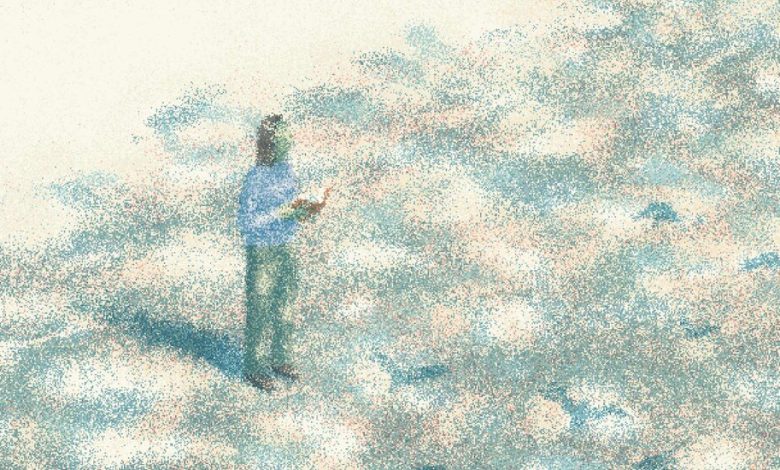‘Why Does God Keep Making Poets?’

In the heat of the summer, this slow curve of the midyear, I find myself wanting to pause and catch my breath. As many people take summer vacations or simply enjoy a cold drink on their porch, it is a good time to take up new kinds of reading. I have written before about why I think poetry is crucial now, and I asked my former poetry teacher, Abram Van Engen, if he’d speak to us about how to read poetry.
Van Engen is a professor in the humanities at Washington University in St. Louis. He co-hosts the podcast “Poetry for All” and is the author of several books, including the forthcoming “Word Made Fresh: An Invitation to Poetry for the Church,” which will be published next year. This interview has been edited and condensed.
Tish Harrison Warren: It seems important to you that poetry is not just for a select group of readers, but for everyone. Can you say why?
Abram Van Engen: When I ask folks whether they read poetry, most say no. When I ask them why, they typically say “because poetry is not written for me” or “I don’t understand it.” I think there is an underlying assumption that poetry is for professionals or you have to have a Ph.D. or be a poet to read it. If people gave themselves a chance to read poetry, they would find poems that really speak to them, that really change and transform them.
My own entrance into the world of poetry came about through a poem I did not understand, “As Kingfishers Catch Fire” by Gerard Manley Hopkins. If you read that poem out loud, I think most people will think, “I don’t know what that means.” But also it’s apparent that it’s this beautiful music of words that he has put together.
I think the world of poetry is wide open for everyone, of every persuasion, to kind of wander around and find in it what they need.
What are good first steps for those who want to read more poetry?
A lot of people want to line up the best poets and start with them. And I think that’s actually a mistake. The best thing to do is just start with any poem, because what matters about poetry is not what other people think of it or think of you reading these particular poems. What matters about poetry is which poems work for you.
Christian Wiman, a poet at Yale Divinity School, has put together a couple of anthologies. One consists of poems about home. Another, poems about joy. There’s a great collection of poems about gratitude and hope. The poet Kevin Young has put together an amazing collection from 250 years of African American poetry. You can read the latest Pulitzer Prize winner, who is my colleague Carl Phillips, and his book, “Then the War,” which is a selection of his poems of the past 20 years. Another colleague, Mary Jo Bang, has an incredible book of elegies.
You can start with anthologies and just read through them and see what kind of poems work for you, what kind of authors work for you. But the trick is: Allow yourself to be bored and confused. Sometimes we come to poetry and we expect too much out of every single poem we read. Not every poem is going to work for you. Keep pushing on until you find the poem that does work for you — when suddenly you read this turn of phrase in a poem and are moved or challenged or something really resonates.
Allowing oneself to be bored and confused is among the most countercultural moves we could make. I feel that reading poetry is a pretty countercultural act in some ways.
Poetry is often about moving at a different speed, about slowing down and lingering with lines, phrases and stanzas. It’s not really a cultural moment for lingering and slowing down.
I also think there’s something slightly countercultural about its approach to truth. A lot of poetry approaches truth on the slant. I get that from Emily Dickinson’s great poem “Tell All the Truth but Tell It Slant.” Truth sometimes is so much that the only way to approach it is to move around it, to glimpse it from an angle. I often think of that poem by Dickinson and others in relation to the story of Moses, who wanted to see God. And God says, “OK, well, you wouldn’t live if that happened. But I will pass by you and you can catch a glimpse.” So he puts Moses in the cleft of a rock. He passes by and for a moment, he allows Moses to see his back, the backside of God. That’s a kind of underlying theory, a presumption, of a lot of poetry. If we actually want to see this true thing, our best approach to it is to catch a glimpse of it as it passes by.
So much is now about statements and principles. And there’s a lot of good to that. But if truth is a little bigger and more complex than any clear statement can sort out, then you’re going to need to approach it through imagery and metaphor.
Speaking of truth, poetry has been a helpful part of my faith and I feel like it opens me up to kinds of truth that are beyond mere rationality. Can you speak to the relationship between poetry and truth?
There isn’t some sort of coded message inside a poem, like a safe with a code. The point of the poem is the reading of the poem itself. What that means is that poetry is about the experience produced by the reading of this poem. And therefore poetry is much more about undergoing something than understanding something. It might take understanding to experience something, but poetry often treats knowledge as an embodied experience.
And I think that relates deeply to a lot of what we see in Scripture. Think about phrases like “Abraham knew Sarah and she became pregnant.” There is something embedded in the language about knowing that is intimate, experienced and embodied. And poetry takes that as a given. What it aims to produce is not just mental awareness, but a kind of experience in and through that mental awareness. It’s an art of language. It’s really about the body. Poetry and poets begin with an understanding that knowledge is gained through a kind of experience of the world.
Your next book is about the connection between faith and poetry, and you have quoted the poet and former head of the National Endowment for the Arts Dana Gioia, saying, “It is impossible to understand the full glory of Christianity without understanding its poetry.” What does that mean to you?
There’s poetry all over Scripture, in Psalms, Song of Songs, Lamentations, Proverbs, Job, Ecclesiastes and the Prophets. And there’s poetry in the liturgy and in the hymns and songs of the church. The Bible beckons us to think about the poetry that exists beyond Scripture itself, which can help us enter into Scripture in a different way. The songwriter Andrew Peterson said: “There have always been poets underfoot. God just keeps making them.” Why does God keep making poets? In every generation and every culture across the world there are poets. There’s a great poem by W.H. Auden, an elegy for Yeats, and he says three times that poetry “survives.” No matter what else, it’s going to keep going. It’s just a part of who we are as human beings, so it behooves us to think about why is it that God made us as people who write poetry?
So why does God keep making poets? Or, to put it another way, what is this inherent human urge for poetry?
One reason I think we keep making poetry is because we are ourselves poems. There’s a verse in the Bible (Ephesians 2:10) in which we are described as the “handiwork of God.” But it’s the same Greek root that goes into the word “poetry.” It means “a made thing.” A more literal translation is that we are, as human beings, the poems of God. So we keep making poetry because we are ourselves poems.
Another way to think about it is that we keep making poetry because it’s part of natural curiosity, exploration and discovery. I trace poetry back to the story in Genesis, when God brings all the creatures of the world before Adam and says, “You name it.” Poetry is created in the world as one of the very first vocations and tasks of human beings, because poetry very often is an attempt to name the world properly, because to name it is to know it. And if we’re going to know it well, we’ve got to name it well, and if we’re going to name it well, we’ve got to pay very careful attention to this world that God has made. So I also think of poetry as the art of attention. It’s the ability to pay attention to the world and produce for the world the name of something that must be known.
How has poetry affected your faith or inspired you?
I think it’s hard to have faith without wonder. You need to have some sense of awe, mystery and not-knowing-ness to have faith in the possibilities of the world and what God has done. And I find that poetry is the art that produces in me the most wonder. If you think about a very simple poem, like “This Is Just to Say” by William Carlos Williams, which is a very famous poem about him stealing plums from an ice box, it’s really a funny “sorry, not sorry” poem. But when I read a poem like that, what I’m really drawn to is its short, plain lines that are meant to draw our attention to the most ordinary things in the world and show us how extraordinary they are.
What are some collections or poets that might awaken wonder for people burned out or discouraged from the past few years?
An easy place to start is with Mary Oliver, who so many people love. She is cleareyed about the horrors of the natural world and also filled with praise and wonder at the beauty of it and describes both with such amazing detail. Another one I would recommend is Li-Young Lee. One of my favorite poems of his is called “From Blossoms.” In the poem, his day is interrupted, to go off on a side trail. In the heat of the day, he finds these incredible peaches and he sort of utterly rejoices in what he calls the “round jubilance” of a peach. That a peach is a peach and can be so amazing on a hot summer day is, to him, astounding. And his ability to describe the experience of it and to be lost in the wonder of it allows you to be transported not just by that, but other experiences you’ve also had. And this great line near the end where he says, “There are days we live as though death were nowhere in the background.” And that experience of joy, which is this sort of breaking in of the eternal into the temporal. That poem just opens into that experience in this most remarkable way.
Tish Harrison Warren (@Tish_H_Warren) is a priest in the Anglican Church in North America and the author of “Prayer in the Night: For Those Who Work or Watch or Weep.”





